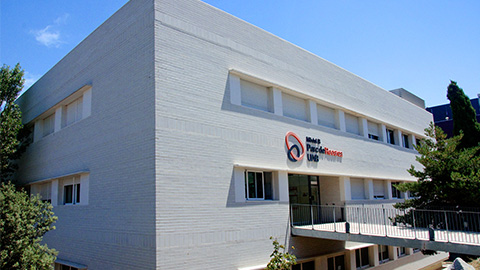The UAB participates in a large-scale genome analysis of COVID-19 risk factors

An international collaboration has identified several genetic markers associated with the SARS-CoV-2 infection and the severity of the disease. The research, published in Nature, included the involvement of ICREA researcher at the IBB, Mario Cáceres.
12/07/2021
In March 2020, thousands of scientists across the world joined forces to find answers to an urgent and complex question: which genetic factors are behind the fact that some COVID-19 patients have a severe reaction to the disease in which their life is endangered and must be hospitalised, while others have few symptoms or are even asymptomatic.
An exhaustive summary of their findings, published recently in Nature, reveals 13 human genome regions (loci) that are strongly associated with severe infections of COVID-19. Researchers also identified causal factors such as smoking and high body mass index. These results come from one of the largest associated genome studies conducted until now, which included 50,000 COVID-19 patients and a control group of two million non-infected individuals. This discovery could help to provide objectives for future therapies and illustrate the power of genetic studies in learning more about infectious diseases.
This global effort, known as COVID-19 Host Genetics Initiative, was founded in March 2020 by Andrea Ganna of the Institute for Molecular Medicine Finland (FIMM) - University of Helsinki, and by Mark Daly, Director of the FIMM and member of the Broad Institute of MIT and Harvard. The initiative has become one of the most extensive collaborations in human genetics and currently includes over 3,300 authors and 61 studies from 25 countries. Participating in the research was ICREA researcher of the Institute of Biotechnology and Biomedicine at the UAB, Mario Cáceres.
To conduct the analysis, the consortium grouped together clinical and genetic data of the almost 50,000 patients who were infected with the virus and the 2 million people from the control group originating from several biobanks, clinical studies and genetic companies. Thanks to the large quantity of data from around the world, scientists were able to rapidly produce statistically solid analyses based on a large diversity of populations; something no one team alone could have done.
Of the 13 loci identified until now by the international team, two have a higher frequency among East Asian and South Asian groups when compared to people of European descent, with emphasis put on the diversity of the whole set of genetic data. Researchers point out one locus in particular, near the FOXP4 gene, which is related to lung cancer. The variant of this gene associated with a severe form of COVID-19 increases its expression, suggesting that inhibiting this gene could be a therapeutic strategy. Other loci associated with severe COVID-19 include the DPP9 gene, also involved in lung cancer and pulmonary fibrosis, and the TYK2 gene, involved in some autoimmune diseases.
Original article:
The COVID-19 Host Genetics Initiative. Mapping the human genetic architecture of COVID-19. Nature. Online July 8, 2021. https://www.nature.com/articles/s41586-021-03767-x
This information is related to the following SDG
Good health and well-being
Partnerships for the goals